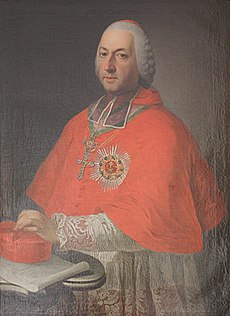Christopher Migazzi
|
His Eminence Christoph Bartholomäus Anton Migazzi |
|
|---|---|
| Cardinal, Prince Archbishop of Vienna | |
 |
|
| Church | Roman Catholic |
| Archdiocese | Vienna |
| Installed | 1757 |
| Term ended | 14 April 1803 |
| Predecessor | Johann Joseph Graf von Trautson |
| Successor | Sigismund Anton Graf von Hohenwart |
| Other posts | Cardinal-Priest of Santi Quattro Coronati |
| Orders | |
| Ordination | 7 April 1738 |
| Consecration | 10 October 1751 |
| Created Cardinal | 23 November 1761 by Clement XIII |
| Rank | Cardinal-Priest |
| Personal details | |
| Born |
October 30, 1714 Trento Italy |
| Died | April 14, 1803 (aged 88) Vienna Austria |
| Buried | St. Stephen's Cathedral, Vienna |
| Coat of arms |  |
Count Christoph Cardinal Anton Migazzi (fully German: Christoph Bartholomäus Anton Migazzi, Graf zu Wall und Sonnenthurm, Italian: Cristoforo Bartolomeo Antonio Migazzi, conte di Waal e Sonnenthurn, Hungarian: Migazzi Kristóf Antal, October 14, 1714, Trento – April 14, 1803, Vienna) was Prince Archbishop of Vienna.
He was born in 1714, in the county of Tyrol. At nine years of age he entered the school for pages at the residence of Prince Bishop Lamberg at Passau, who later proposed him for admittance to the Collegium Germanicum in Rome. At the age of twenty-two he returned to the Tyrol and devoted himself to the study of civil and canon law.
Cardinal Lamberg took him as conclavist to the conclave of 1740, whence Benedict XIV came forth pope, and to him Cardinal Lamberg earnestly recommended his favourite Migazzi. The latter remained at Rome "in order to quench my thirst for the best science at its very source". By this he meant philosophy as proved by his words spoken about this time: "Without a knowledge of philosophy wit is merely a light fragrance which is soon lost, and erudition a rude formless mass without life or movement, which rolls onward unable to leave any mark of its passage, consuming everything without itself deriving any benefit therefrom." In 1745 he was appointed auditor of the Rota for the German nation.
Owing to the special friendship of Benedict XIV, he was able to conclude several difficult transactions to the entire satisfaction of the Habsburg Empress Maria Theresa, who in return appointed him in 1751 coadjutor to the aged Archbishop of Mechlin. Thereupon consecrated bishop, he was soon removed to Madrid as ambassador in Spain. A treaty which he concluded pleased the empress so much that she appointed him coadjutor of Count Bishop Althan of Waitzen (1756); but as Althan died before his arrival, and six months later Prince Archbishop Trantson also died in Vienna, the empress named Migazzi his successor.
...
Wikipedia
